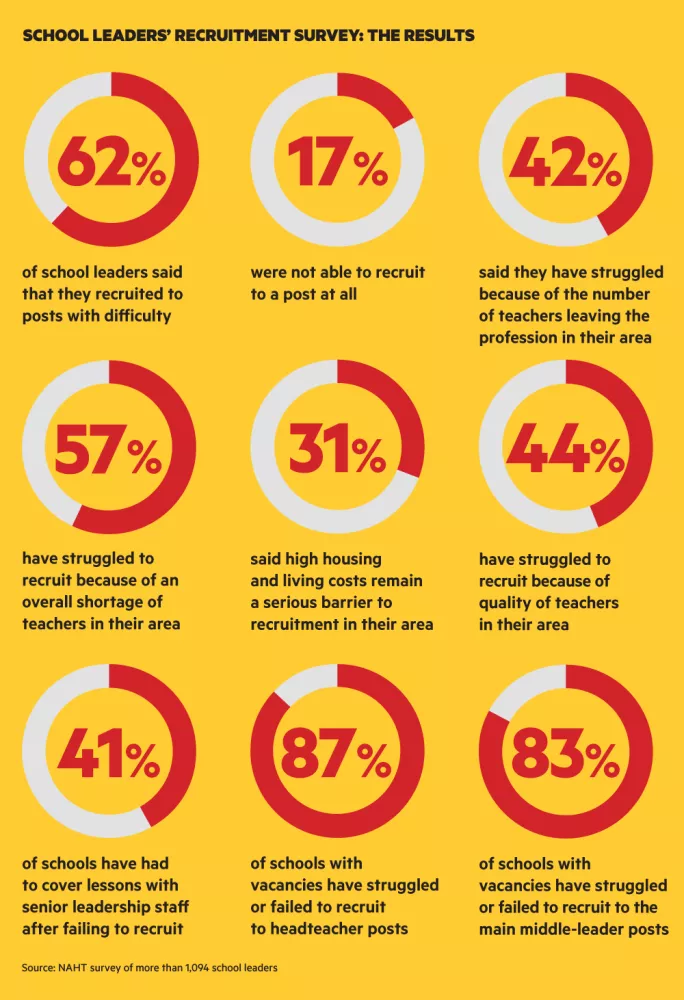Heads blame quitters for recruitment turmoil

The number of school leaders blaming recruitment problems on an exodus of teachers from the profession in their local area has dramatically risen, a new survey shows.
In 2014, just 15 per cent of school leaders said the rate at which teachers were quitting the job locally was making it harder to recruit, but the figure has jumped to 42 per cent this year.
The study by the NAHT headteachers’ union comes amid growing evidence, unearthed by TES, of heads offering “golden handshakes” and other financial incentives to recruit and retain teachers (see box, below).
The NAHT survey found that almost fourin-five schools have struggled to fill, or failed to fill, vacancies this year.
Latest government figures show that nearly a third of teachers who entered the profession in 2010 had dropped out within five years - although this has not markedly declined in more than a decade.
‘Government is falling short’
Russell Hobby, leader of the NAHT, has warned of the “damage” being done to the teaching profession by poor retention rates.
“After three years of warnings by NAHT, the government is still falling short of its core responsibility to guarantee enough teachers of a high enough standard to meet the needs of our growing school population,” he added.
The figures are contained within the union’s annual recruitment survey, which polled more than 1,000 school leaders. This is the third year that they have run the research.
The new data has also revealed a rise in the number of school leaders across the country citing high housing and living costs as contributing to problems, from 24 per cent to 31 per cent in a year. One primary school headteacher in London told TES that three of his teachers are leaving at Christmas because of high costs.
It is not only teachers that schools are struggling to recruit. More than four-fifths of those surveyed said they had struggled or failed to recruit middle-leader and headteacher posts.
James Bowen, director of NAHT Edge, the middle leaders’ section of the union, said: “The difficulty school leaders are having recruiting middle and senior leadership roles is worrying and has significant consequences for the future, if not addressed. Now, more than ever, we need teachers to be stepping up to leadership positions in schools.”

Leaving early
Tim Barnes, headteacher at Alkrington Primary School, Rochdale, said: “It is a worry for me, and my governors, that teachers are leaving the profession earlier in their career due to the pressure and workload, and they are not stepping up to leadership.”
One of his Year 6 teachers - who has been working there for 15 years - is quitting to become a professional dog walker because she finds the current pressures “difficult to tolerate”, the head said.
Increasingly, it has also become more difficult to recruit and retain Year 5 and 6 teachers in his school. Mr Barnes said: “The marking workload, particularly higher up the school, is quite intense. In some cases, teachers are taking home 90 books every day and some stay up until midnight to mark.”
On the findings of the report, Mr Hobby said: “It shows just how much damage is being done to the teaching profession. Faced with long working hours, unmanageable workloads, weak training and low salaries, the profession is failing to keep talented staff.
“The government must make the changes necessary to ensure a workforce that can deliver the best education for all. This should be the focus of our attention, not the distraction of new structures. It’s not rocket science: pay people properly and treat them well.”
A Department for Education spokesperson said that the government was investing more than £1.3 billion over this Parliament “to attract the brightest and best into teaching”.
They added: “There are more people entering the profession than leaving it, but we recognise that in a competitive economy some schools can face recruitment challenges. We are also working with the sector to tackle issues that teachers tell us are most likely to lead to them consider leaving, such as unnecessary workload and poor pupil behaviour.”
You need a Tes subscription to read this article
Subscribe now to read this article and get other subscriber-only content:
- Unlimited access to all Tes magazine content
- Exclusive subscriber-only stories
- Award-winning email newsletters
Already a subscriber? Log in
You need a subscription to read this article
Subscribe now to read this article and get other subscriber-only content, including:
- Unlimited access to all Tes magazine content
- Exclusive subscriber-only stories
- Award-winning email newsletters